Her Third is a film of genre Drama directed by Egon Günther with Armin Mueller-Stahl
Her Third (1972)
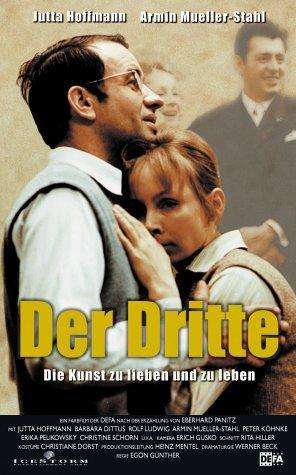
If you like this film, let us know!
Her Third (German: Der Dritte) is a 1972 East German (then GDR) film directed by Egon Günther and starring Jutta Hoffmann, Barbara Dittus, Rolf Ludwig and Armin Mueller-Stahl. The film is based on the short story Unter den Bäumen regnet es zweimal by Eberhard Panitz and tells the story of the single mother Margit looking for a new partner. The film was produced in 1971 by the DEFA film studio and premiered on 16 March, 1972 in East Berlin.
Synopsis
Margit Fließer (Jutta Hoffmann) is in her mid-thirties, has two children and has been divorced twice. She works as a mathematician in a medium-sized company where she is well respected by her colleagues. Margit has a shy and repressed personality due to her past and her childhood. Margit became a nurse in a Protestant order following the early death of her mother. Realizing that this vocation is not really for her she starts her studies at a university preparatory school. She falls in love with the lecturer Bachmann (Peter Köhncke), who becomes her first husband. The marriage fails, and she enters a second marriage with a blind man (Armin Mueller-Stahl). But her new husband is a disappointment and this second marriage also fails. She now decides to find "her third" husband herself and not leaving it up to fate. She chooses Hrdlitschka (Rolf Ludwig), a colleague, but only after some efforts and with the help of her friend Lucie (Barbara Dittus) she is successful and wins Hrdlitschka as her third husband.Actors

Armin Mueller-Stahl
(Blinder)

Jutta Hoffmann
(Margit Flieser)

Barbara Dittus
(Lucie)
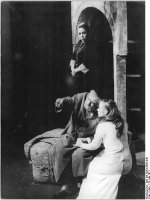
Christine Schorn
(junge Frau)

Jaecki Schwarz
(junger Mann)
Comments
Leave comment :
Suggestions of similar film to Her Third
There are 57 films with the same actors, 3 films with the same director, 68210 with the same cinematographic genres (including 13417 with exactly the same 2 genres than Her Third), to have finally 70 suggestions of similar films.If you liked Her Third, you will probably like those similar films :
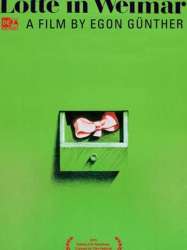
Lotte in Weimar (1975)
, 2h5Directed by Egon Günther
Origin German
Genres Drama, Comedy, Historical
Themes Films about writers, Philosophie
Actors Lilli Palmer, Martin Hellberg, Jutta Hoffmann, Katharina Thalbach, Norbert Christian, Thomas Thieme
Rating62%





En 1816, Charlotte Kestner voyage en compagnie de sa fille, et s'arrête à Weimar, à l'hôtel l'Éléphant. Les gens des alentours reconnaissent en elle le grand amour de jeunesse de Goethe, celle dont il s'était inspiré pour écrire Werther. Prévenu par les rumeurs, le poète, qui vit toujours à Weimar, finit par lui rendre visite.

Morenga (1985)
, 1h52Directed by Egon Günther
Genres Adventure
Themes Films set in Africa
Actors Jacques Breuer, Herbert Weißbach, Tobias Hoesl, Harry Riebauer, Arnold Vosloo, Vernon Dobtcheff
Rating70%






The Dress (1991)
, 1h28Directed by Egon Günther, Konrad Petzold
Genres Comedy
Actors Wolf Kaiser, Günther Simon, Harry Riebauer
Rating64%





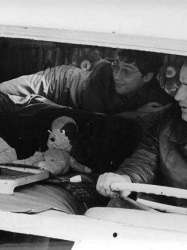
Long Roads - Secret Love (1969)
Directed by Herrmann Zschoche
Genres Drama, Comedy, Romance
Actors Manfred Krug, Jaecki Schwarz, Jutta Hoffmann
Rating59%






The Wounded Man (1983)
, 1h49Directed by Patrice Chéreau, Serge Meynard, Pierre Romans, Ronald Chammah
Origin France
Genres Drama, Horror, Crime, Romance
Themes Films about sexuality, Erotic films, LGBT-related films, Films about prostitution, Erotic thriller films, LGBT-related films, LGBT-related film
Actors Jean-Hugues Anglade, Vittorio Mezzogiorno, Roland Bertin, Claude Berri, Lisa Kreuzer, Armin Mueller-Stahl
Rating65%





Henri est un jeune homme ordinaire, fils d'un ouvrier d'origine polonaise. Il s'ennuie dans sa famille. Un jour, il croise par hasard dans une gare parisienne Jean, un homme impliqué dans le milieu de la prostitution. Ressentant de la passion pour cet homme plus âgé, Henri tente de se prostituer pour gagner son amour.

Angry Harvest (1985)
, 1h45Directed by Agnieszka Holland
Origin German
Genres Drama, War, Romance
Themes Films about religion, Political films, Films about Jews and Judaism
Actors Armin Mueller-Stahl, Elisabeth Trissenaar, Wojciech Pszoniak, Gerd Baltus, Tilly Lauenstein, Margit Carstensen
Rating70%





In the winter of 1942-43, a Jewish family leaps from a train going through Silesia. They are separated in the woods, and Leon, a local peasant who's now a farmer of some wealth, discovers the woman, Rosa, and hides her in his cellar. Leon's a middle-aged Catholic bachelor, tormented by his sexual drive. He doesn't tell Rosa he's seen signs her husband is alive, and he begs her to love him. Rosa offers herself to Leon if he'll help a local Jew in hiding who needs money. Leon pays, and love between Rosa and him does develop, but then Leon's peasant subservience and his limited empathy lead to tragedy.
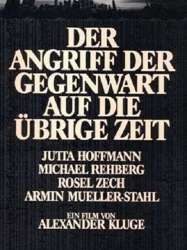 , 1h53
, 1h53Directed by Alexander Kluge
Genres Documentary
Actors Jutta Hoffmann, Armin Mueller-Stahl, Hans-Michael Rehberg, Rosel Zech
Rating70%






Trace of Stones (1966)
, 2h19Directed by Frank Beyer
Genres Drama, Comedy, Romance
Actors Manfred Krug, Jutta Hoffmann, Helga Göring, Hans-Peter Reinecke
Rating73%





L'anarchiste Balla est le roi de son chantier : dur mais généreux. Mais le nouveau secrétaire général du parti veut imposer l'ordre et le droit. Tout deux sont épris de la même femme.

Anton the Magician (1978)
, 1h46Directed by Günter Reisch
Genres Drama, Comedy, Romance
Actors Ulrich Thein, Erwin Geschonneck, Anna Dymna, Barbara Dittus, Leon Niemczyk, Grigore Grigoriu
Rating65%






Lola (1981)
, 1h53Directed by Rainer Werner Fassbinder
Origin German
Genres Drama, Comedy, Romance
Themes Films about sexuality, Erotic films, Films about prostitution, Erotic thriller films
Actors Barbara Sukowa, Armin Mueller-Stahl, Mario Adorf, Karin Baal, Ivan Desny, Hark Bohm
Rating73%





In 1957–1958 in Coburg, in post-World War II West Germany, Schuckert (Mario Adorf) is a local construction entrepreneur whose methods of gaining wealth include shady business practices such as bribing the local officials. His latest scheme is endangered with the arrival of von Bohm (Armin Mueller-Stahl), a high-minded building commissioner.
 Connection
Connection